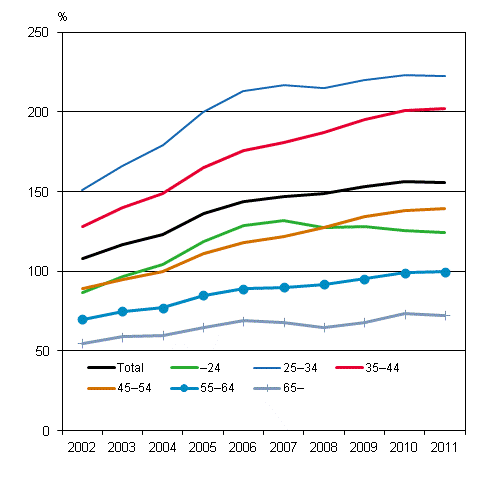Published: 18 January 2013
Indebtedness of household-dwelling units slowed down in 2011
The debts of indebted household-dwelling units amounted to 155 per cent of their annual income in 2011. In 2010, the size of their debts was 156 per cent of their income, so the rate of indebtedness of indebted household-dwelling units fell slightly from the previous year. In nominal terms, the income of indebted household-dwelling units grew by 6.2 per cent and debts by 5.5 per cent. The rates of indebtedness of middle-aged household-dwelling units grew further, but indebtedness decreased among persons aged 35 or under and pensioners.
Rates of indebtedness of indebted household-dwelling units by age group in 2002-2011, %

The rate of indebtedness of all household-dwelling units continued to grow slightly, being 111 per cent in 2011 and 110 per cent in 2010. The income of all household-dwelling units grew less than that of indebted household-dwelling units, by 4.5 per cent. Over the decade, the rate of indebtedness of household-dwelling units has increased considerably, because in 2002 that rate was 70 per cent among all household-dwelling units.
Household-dwelling units in the 35 to 44 age group had the largest debts: EUR 103,700 per indebted household-dwelling unit. However, slightly younger household-dwelling units of those aged 25 to 34 had the biggest housing loans. The housing loans in that age group were EUR 118,850 per household-dwelling unit with housing loan. Housing loans accounted for the largest share of the debts of household-dwelling units of all ages, and their share was still nearly one-half even of the debts of pensioner households.
The number of household-dwelling units whose debts were at least triple compared with their disposable annual income was 264,920, or 17 per cent of all indebted household-dwelling units. In 2002, 97,370 household-dwelling units were this much in debt, that is, around eight per cent of indebted household-dwelling units. Household-dwelling units where the reference person was aged 25 to 34 were generally the most indebted. Of them, in 96,820 household-dwelling units, or 30 per cent of indebted household-dwelling units, debts were at least triple compared with their annual income.
In all, 1,519,400 household-dwelling units, or 59 per cent of all units, had debts. Their total debt amounted to EUR 105.5 billion. The amount of debt per indebted household-dwelling unit was EUR 69,450. Most, or EUR 76.8 billion, of the debts were housing loans. The amount of housing loan per household-dwelling unit with housing debt was EUR 89,350. Household-dwelling units' other debts, such as loans for cars, free-time residences or general consumption, amounted to EUR 21.7 billion, loans for business purposes to EUR 5.5 billion and study loans to EUR 1.5 billion.
Of all debts, housing loans grew most in 2011, by 6.2 per cent. Other debts increased by 5.5 per cent and study loans by 3.7 per cent. Loans taken out for business purposes diminished by 2.9 per cent.
During the past decade, housing loans have increased more than other debts. Indeed, their share of debts has grown clearly: in 2002 the share of housing loans was 65 per cent, but in 2011 already as high as 73 per cent of all debts of household-dwelling units. The share of other liabilities has remained at slightly over one-fifth of all debts. Over this period, the share of loans taken out for business purposes in all debts has decreased from eleven to five per cent and study loans from around three to one-and-a-half per cent.
Household-dwelling units paid EUR 2.7 billion in interests in 2011. Interest expenses grew by 18 per cent in nominal terms. Average interest expenses per indebted household-dwelling unit were EUR 1,760. Sixty per cent of indebted household-dwelling units paid at most EUR 1,000 in interests and seven per cent over EUR 5,000.
Source: Indebtedness 2011. Statistics Finland
Inquiries: Timo Matala 09 1734 3422
Director in charge: Riitta Harala
- Tables
-
Tables in databases
Pick the data you need into tables, view the data as graphs, or download the data for your use.
Updated 18.1.2013
Official Statistics of Finland (OSF):
Indebtedness [e-publication].
ISSN=2489-3285. 2011. Helsinki: Statistics Finland [referred: 19.4.2025].
Access method: http://stat.fi/til/velk/2011/velk_2011_2013-01-18_tie_002_en.html

